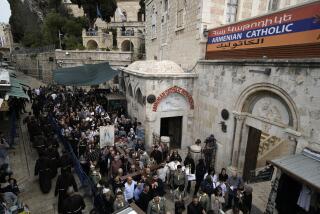Christian Copts’ anger escalates in wake of Egypt attacks
- Share via
Reporting from Cairo — The New Year’s Day bombing of an Alexandria church that left 25 Christians dead and scores more injured has unleashed a wave of anger among Egypt’s minority Copts directed at their government and Muslim countrymen.
Though Egyptian President Hosni Mubarak rushed to blame “foreign hands,” officials hinted at Al Qaeda involvement and hundreds of Muslims joined demonstrations on Monday and Saturday to condemn the attack, the bombing highlighted discontent in the Middle East’s largest Christian community over how its members are treated in this country.
Egypt’s religious climate, some say, encourages the kinds of extremist groups that could carry out such attacks.
“We are not talking about movements in the scale of Al Qaeda but other, smaller groups using violence against Copts do exist in Egypt,” said Rafik Habib, a prominent Coptic intellectual. “We have many Muslims who have developed a way of hatred toward Copts and believe that Copts are empowered by the West to confront anything Muslim.”
Many Copts believe that the killings are yet another phase in developments that demonstrate their marginalization and oppression at the hands of the Muslim majority and the country’s nominally secular leadership. As a church official read out a statement of condolences by Mubarak at a burial late Saturday, Copts began shouting in protest: “No, no, no!”
On Sunday evening, a number of ranking government officials meeting with Coptic Pope Shenouda III were forced to hastily leave church headquarters from a rear exit to avoid confrontations with angry protesters outside.
“With our souls and our blood, we will redeem the holy cross,” they chanted in Cairo and other, smaller demonstrations throughout the country.
“I’ve seen discrimination all my life. In college, at work,” said one demonstrator in Alexandria who requested anonymity because of the sensitivity of the issue. “I am not going to take it any longer.”
Indeed, despite rising attacks against Copts in recent years, the government has played down claims of a religious conflict in Egypt.
“Copts need more protection in their own country,” said Rami Ishak, a 34-year-old Coptic architect. “It seems to me that there is a systemized campaign of hatred by some Muslim extremists towards us.”
Regardless of foreign involvement, Copts say, Egyptians must have participated in the New Year’s Day bombing.
Though the scale of the attack was large and the body count unusually high, many believe the bombing was part of a recent escalation of tensions between Muslims and Copts. A year ago, six Copts and a Muslim were killed in a drive-by shooting outside a church in the southern city of Nag Hammadi. Two other Copts were killed last month during a demonstration that erupted after authorities rejected the conversion of a Christian social center into a church.
No one had yet claimed responsibility for the Alexandria attack. It followed threats by Al Qaeda’s Iraqi branch to target Egyptian Copts unless two priests’ wives, who are allegedly being locked up in a monastery following their conversion to Islam, are released. However, it was unclear that the group has the ability to strike targets outside Iraq.
In Europe, several governments warned of possible attacks against Coptic churches. The German government said it had issued a warning to Coptic Christians just hours before the Alexandria blast, Reuters news service reported.
“I can confirm that on New Year’s Eve the Interior Ministry contacted the bishop of the Coptic Christians in Germany, Anba Damian, to tell him about this risk,” German Interior Ministry spokesman Stefan Paris told reporters.
A French court said it had opened an investigation after a priest in the greater Paris region complained of online threats against Coptic Christians, the news service said.
Hassan is a news assistant in The Times’ Cairo Bureau. Times staff writer Borzou Daragahi in Beirut contributed to this report.
More to Read
Sign up for Essential California
The most important California stories and recommendations in your inbox every morning.
You may occasionally receive promotional content from the Los Angeles Times.













